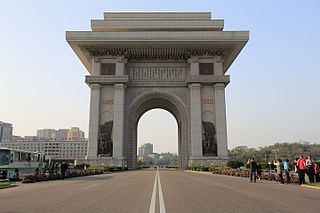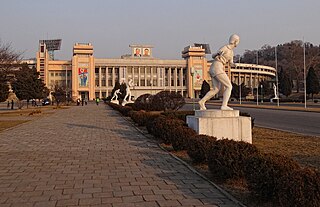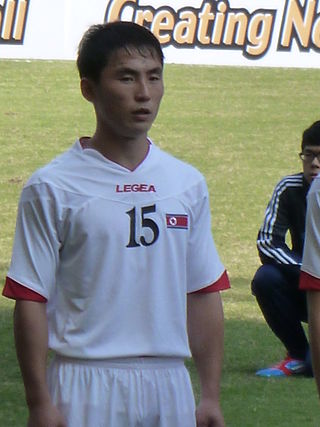| |||||
| Centuries: | |||||
|---|---|---|---|---|---|
| Decades: | |||||
| See also: | Other events in 1990 Years in North Korea Timeline of Korean history 1990 in South Korea | ||||
Events from the year 1990 in North Korea .
| |||||
| Centuries: | |||||
|---|---|---|---|---|---|
| Decades: | |||||
| See also: | Other events in 1990 Years in North Korea Timeline of Korean history 1990 in South Korea | ||||
Events from the year 1990 in North Korea .

North Korea, officially the Democratic People's Republic of Korea (DPRK), is a country in East Asia. It constitutes the northern half of the Korean Peninsula and borders China and Russia to the north at the Yalu (Amnok) and Tumen rivers, and South Korea to the south at the Korean Demilitarized Zone. The country's western border is formed by the Yellow Sea, while its eastern border is defined by the Sea of Japan. North Korea, like its southern counterpart, claims to be the sole legitimate government of the entire peninsula and adjacent islands. Pyongyang is the capital and largest city.

Pyongyang is the capital and largest city of North Korea, where it is sometimes labeled as the "Capital of the Revolution". Pyongyang is located on the Taedong River about 109 km (68 mi) upstream from its mouth on the Yellow Sea. According to the 2008 population census, it has a population of 3,255,288. Pyongyang is a directly administered city with a status equal to that of the North Korean provinces.

Kim Jong Il was a North Korean politician who was the second supreme leader of North Korea. He led North Korea from the death of his father Kim Il Sung in 1994 until his death in 2011, when he was succeeded by his son, Kim Jong Un. Afterwards, Kim Jong Il was declared Eternal General Secretary of the Workers' Party of Korea (WPK).

The North Korea national football team represents North Korea in men's international football and it is controlled by the DPR Korea Football Association, the governing body for Football in North Korea. The team represents both FIFA and Asian Football Confederation (AFC).

Kim Il Sung Stadium (Korean: 김일성경기장) is a multi-purpose stadium located in Pyongyang, the capital city of North Korea. The stadium is used primarily for association football matches.

The Democratic People's Republic of Korea women's national football team represents North Korea in international women's football.

The DPR Korea Premier Football League is the men's top professional football division of the North Korean football league system. The DPR Korea Premier Football League was established in 2017, replacing previous football tournaments held in a knockout format which served as a highest-level football competition in the Democratic People's Republic of Korea.

Pyongyang Sports Club is a North Korean organization of education specialty with several departments. This organization is based in Pyongyang and plays at the Kim Il Sung Stadium. As the sports club of the Workers' Party of Korea and Government of Pyongyang, Pyongyang SC is the largest sports club not affiliated with a state ministry.

April 25 Sports Club, shortly 4.25 SC, also known as April 25 National Defence Sports Club, is a multi-sports club based in Pyongyang, North Korea, primarily known for its men's and women's football teams. The club belongs to the Ministry of People's Armed Forces; all members of the professional teams are considered officers of the Army.
Song is a Korean family name derived from the Chinese surname Song. Songs make up roughly 1.4% of the Korean population; the 2000 South Korean census found 622,208 in that country.
Baek, also often spelled Paek, Baik, Paik, or Back is a Korean family name. In the year 2000, there were 351,275 people with this surname in South Korea. The word means the color white.

Jung is a Latin alphabet rendition of the Korean family name "정", also often spelled Jeong, Chung, Joung or Jong. As of the South Korean census of 2015, there were 2,407,601 people by this name in South Korea or 4.84% of the population. The Korean family name "정" is mainly derived from three homophonous hanja. 鄭 (2,151,879), 丁 (243,803) and 程 (11,683). The rest of the homophonous hanjas include: 政 (139), 桯 (41), 定 (29), 正 (22) and 情 (5).

Kim Il Sung was a North Korean politician, revolutionary, and military leader. He founded the Democratic People's Republic of Korea, commonly known as North Korea, which he led as Supreme Leader from its establishment in 1948 until his death in 1994. Afterwards, he was succeeded by his son Kim Jong Il and was declared Eternal President.

This article is about matches between North Korean and South Korean national football teams.

Jong Il-gwan is a North Korean professional footballer who plays as a striker for DPR Korea Premier Football League club Ryomyong and the North Korea national team. He is the country's all-time top scorer.

An Il-bom is a North Korean football midfielder presently playing for April 25 in the DPR Korea Premier Football League.
Events from the year 2007 in North Korea.
Events from the year 1998 in North Korea.
Kim Sung-il (김성일) may refer to:
Han Hyong-il is a North Korean former footballer. He represented North Korea on at least twenty-five occasions between 1980 and 1990, scoring six times.